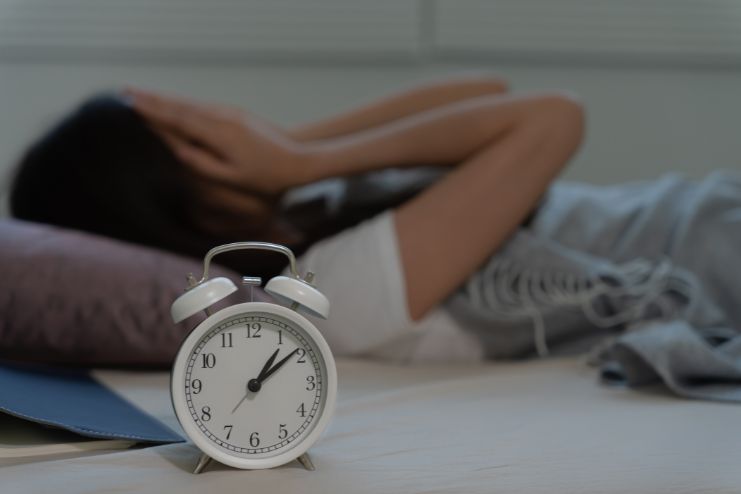Affiliate Disclaimer
Some links in this article are affiliate links. We may earn a small commission if you make a purchase through these links, at no extra cost to you. We only recommend products we find useful to our readersWaking up naturally versus using an alarm has sparked an interesting debate as people become more mindful of their sleep and overall health. On one side, waking up naturally is believed to be more in tune with our body’s internal clock—our circadian rhythm. Allowing ourselves to wake up without external interruptions leads to better energy levels, mood, and long-term well-being.
However, not everyone has the luxury of waking up without an alarm, especially with demanding schedules or irregular sleep patterns. So, while waking naturally may be ideal, alarms often remain the practical choice for many.
In this article, we’ll explore the age-old debate about waking up naturally versus relying on alarms. We’ll explore the science behind both methods, breaking down how each approach affects your body, energy levels, and overall well-being.
Whether you need the buzz of an alarm or dream of waking up with the sunrise, this article will help you understand the pros and cons of each method and which might work best for your lifestyle.
Why Do Most People Rely on Alarms?

Let’s be real—how many of us would wake up on time without an alarm? Exactly! Alarms are a lifeline, helping us get out of bed for work, school, or tackling our to-do list. They are essential as they give us a much-needed nudge to start our day.
For deep sleepers or those with irregular patterns, alarms are a must—even if that means using crazy ones that jump off the nightstand! Alarms also bring consistency, training our brains to stick to a routine and making mornings less of a struggle.
Scientifically, alarms help override our circadian rhythm when it’s out of sync, especially for those dealing with sleep deprivation or insomnia. So, love them or hate them, alarms keep us accountable and on track.
But now, people are exploring natural waking—and it’s gaining popularity. Let’s explore why this approach could improve your mornings and overall well-being.
READ MORE: 7 Silent Alarm Clocks: Wake Up Gently for a Relaxing Start to Your Day
The Concept of Natural Waking and Its Growing Popularity
Natural waking is pretty much what it sounds like—waking up whenever your body decides it’s ready, without the rude interruption of an alarm. For some, that means rolling out of bed super late (we’ve all been there!), but there’s more to it. A lot of factors come into play, like how tired you were the night before, how consistent your sleep routine is, and even room temperature.
More and more people are starting to ditch their alarms and embrace waking up naturally. Why? With all the stress, screen time, and busy schedules, many of us have thrown off our bodies’ natural clock. Alarms get us out of bed, but they also interrupt sleep cycles and leave us groggy. On the other hand, waking up naturally means your body’s fully rested, and you start the day with better energy and focus.
As people become more interested in sleep health and wellness, natural waking is becoming a go-to method for improving not just sleep quality but also overall well-being. It’s all about syncing with your body’s cues instead of relying on alarms to shock you awake every morning.
How the Body’s Internal Clock Works
A lot is happening inside us that affects every part of our day-to-day lives, especially when it comes to sleep. From hormones quietly working behind the scenes to the way our body naturally moves through different stages of rest, it all ties back to our internal clock. Let’s dive in and understand how this internal clock works and what influences our sleep cycles.
The Role of the Circadian Rhythm in Sleep and Wakefulness
The Circadian Rhythm silently does it all. It basically decides when we feel sleepy, when we feel completely rested, and everything in between. It keeps our sleep-wake cycle aligned with the natural day-night pattern. Morning light plays a key role in resetting this internal clock, signaling that it’s time to wake up and get moving. As the evening approaches and the light fades, our body naturally prepares for rest, ensuring we’re ready for sleep at just the right time.
Tips to Improve Your Circadian Rhythm
- Stick to a consistent sleep schedule, even on weekends.
- Get plenty of natural sunlight during the day, especially in the morning.
- Avoid bright screens and lights before bedtime.
- Create a relaxing bedtime routine to wind down.
- Keep your bedroom dark, cool, and quiet for optimal sleep.
- Limit caffeine and heavy meals in the late afternoon and evening.
- Get regular exercise, but not too close to bedtime.
- Avoid long naps during the day to maintain your sleep cycle.
- Expose yourself to morning light to help reset your internal clock.
- Practice mindfulness or meditation to reduce stress before bed.
How Melatonin and Cortisol Regulate Wake-Up Timing
Melatonin is nature’s sleep signal. Once it gets dark, your body starts producing it, and you feel drowsy. It reaches its peak in the middle of the night, and as soon as the morning light hits, your body knows it’s time to wake up because melatonin production slows down. A part of your brain controls this whole process called the SCN—the internal clock that tells your brain when it’s time to get you sleepy.
Then there’s cortisol, the hormone that kicks in when it’s time to wake up. Contrary to its reputation as the “stress hormone,” cortisol is very helpful in getting you energized in the morning. While you’re asleep, cortisol stays low, but as dawn approaches, it rises and gets you prepped for the day. Exposure to sunlight gives it an extra boost, helping with your blood pressure, energy levels, and more.
What’s fascinating is how these two hormones work together—melatonin helps you sleep at night, while cortisol prepares you for the day. If they fall out of sync, though, your sleep cycle can be disrupted and leave you groggy.
The Impact of Sleep Cycles on Natural Waking

Waking up naturally is more than just skipping the alarm—it’s about letting your body decide when it’s time to rise, in sync with your internal clock, or circadian rhythm. This natural rhythm controls a lot of what happens in your body, including when you feel sleepy and when you feel energized. It’s heavily influenced by light, so when you’re exposed to sunlight in the morning, your body decreases melatonin, the hormone that makes you sleepy, and increases cortisol, which helps you feel alert and ready to tackle the day.
Throughout the night, your body cycles through different stages of sleep, including light, deep, and REM sleep. If you wake up naturally, you’re most likely coming out of a lighter sleep stage, making it easier to feel refreshed rather than groggy. This is what makes natural waking so ideal—it aligns with your sleep cycles and helps you ease into wakefulness.
Life is unpredictable and doesn’t go as planned. Late nights, irregular schedules, and even stress can mess with this natural flow, making it harder for your body to wake up when it’s supposed to. That’s where things get tricky and why many of us rely on alarms to make sure we don’t oversleep or feel out of sync with the day.
The Downsides of Alarm-Based Wake-Ups

Waking up to a blaring alarm isn’t the most pleasant way to start the day. Sure, it gets the job done, but it often leaves us feeling slightly off. Why does that happen? Waking up abruptly to an alarm can have detrimental effects on both physical and mental well-being. From feeling groggy to increasing stress, alarms might be doing more harm than good. Let’s break it down and see why alarm-based wake-ups might not be the healthiest option.
Sleep Inertia: Why Waking Up to an Alarm Can Leave You Groggy
Alarms often jolt you awake during a deep sleep phase, triggering what’s known as sleep inertia. The deeper the sleep when the alarm goes off, the more intense this groggy feeling becomes. Your body needs time to transition out of its natural sleep cycles, but alarms disrupt this process.
This is why, even after a full night’s sleep, you can still wake up feeling more tired than when you went to bed. Naturally waking up, on the other hand, allows your body to complete its sleep cycles and gently wake, helping you avoid that sluggish feeling.
READ MORE: 7 Reasons you Feel Groggy After Waking Up & How To Avoid Inertia!
The Effects of Abrupt Wake-Ups on Heart Rate and Stress Levels
When your alarm goes off suddenly, your body triggers a fight-or-flight response, causing an immediate spike in heart rate and cortisol, the stress hormone. This abrupt wake-up can leave you feeling anxious or stressed even before your morning coffee.
Over time, relying on alarms daily can negatively affect your health, as this stress response makes your heart work harder than necessary, starting your day with unnecessary tension. Waking up naturally helps keep your body calm, allowing you to begin your day with lower stress levels.
How Alarms Can Disrupt Deep Sleep and REM Cycles
REM sleep is crucial for memory consolidation and emotional regulation. When alarms interrupt this important phase, it can leave you feeling mentally foggy and emotionally unbalanced. Cutting through deep sleep or REM stages reduces the restorative effects of a full night’s rest, and over time, this disruption can impact your brain’s ability to process and retain information.
Lack of REM sleep has also been linked to mood swings, irritability, and even long-term cognitive issues. Waking up naturally allows your body to complete its sleep cycles, ensuring you get the full benefits of your rest.
READ MORE: Improper Sleep Quality Can Affect Gut Microbiome
The Benefits of Waking Up Naturally
Waking up naturally feels like the ultimate win for your body and mind. When you let your internal clock do its thing, you’re not only setting yourself up for a great morning but also for a day filled with better energy and focus. Unlike the abrupt jolt of an alarm, natural waking allows your body to ease out of sleep, leaving you feeling more balanced and ready to tackle the day. Let’s look at some of the key benefits of waking up without an alarm.
- Boosts mood and energy by allowing your body to complete sleep cycles.
- Enhances mental clarity and decision-making throughout the day.
- Reduces stress by avoiding sudden cortisol spikes in the morning.
- Supports heart health with a smoother, less jarring wake-up process.
- Promotes a consistent sleep schedule for better overall rest.
- Strengthens the immune system by improving sleep quality and recovery.
READ MORE: 11 Benefits Of Waking Up Early Morning You Didn’t Know Of
Can Everyone Realistically Wake Up Without an Alarm?
Let’s be real: Not everyone has the luxury of waking up naturally without an alarm. Sure, it sounds great in theory, but in practice, life often gets in the way. Whether it’s work schedules, family responsibilities, or just too little sleep, waking up on your own isn’t always realistic. That doesn’t mean it’s impossible, though! With a bit of consistency and the right environment, some people can manage to ditch their alarms altogether. Let’s take a closer look at what influences this and when alarms might still be necessary.
The Role of Sleep Consistency and Sleep Debt
Waking up naturally becomes easier when you have a regular sleep schedule. However, if you’re running on sleep debt (constantly lacking sleep), it can make alarm-free waking feel impossible.
- Sleep debt from poor sleep habits or long work hours makes people more reliant on alarms.
- A chronic lack of sleep can lead to health problems, making natural waking unrealistic.
- Prioritizing regular sleep patterns can help reduce the need for alarms over time.
How Lifestyle Factors (Work Schedules, Responsibilities) Affect Natural Waking
Let’s face it—our modern lives don’t always allow for natural waking. Strict work schedules and responsibilities like parenting make alarms a necessary evil.
- Shift work or long hours often force you to rely on alarms to wake up.
- Irregular schedules disrupt circadian rhythms, making natural waking impractical.
- Family responsibilities or early work hours limit the possibility of waking up naturally.
- Adjusting your routine to fit your sleep cycles may help, but it isn’t always possible.
When Using an Alarm is Unavoidable
For many of us, alarms are part of life. But that doesn’t mean you have to wake up to a blaring siren—there are gentler ways to wake up that don’t shock your system.
- Sunrise alarms simulate natural light, helping ease your body out of sleep gradually.
- Gradual sound alarms increase in volume slowly, allowing for a less abrupt wake-up.
- Using softer tones or soothing music can make the alarm less jarring.
- Pairing a gentler alarm with a regular sleep routine may improve your mornings.
How to Train Yourself to Wake Up Naturally

Training your body to wake up without an alarm takes time and consistency, but it’s entirely possible. By adopting a few mindful habits, you can align your internal clock to wake up refreshed. Let’s explore some practical strategies to help you embrace natural waking over alarms.
Setting a Consistent Sleep Schedule
Going to bed and waking up at the same time every day helps regulate your internal clock and makes natural waking much more achievable.
- Stick to the same sleep schedule, even on weekends.
- Gradually adjust your bedtime if needed for consistency.
- Track your sleep patterns to ensure you’re getting enough rest.
- Avoid late-night screen time, which can disrupt your schedule.
Optimizing Sleep Quality (Dark Room, Temperature, Noise Control)
Creating a comfortable sleep environment encourages deeper, more restful sleep, which in turn supports natural waking.
- Use blackout curtains to block any light that might disturb your sleep.
- Keep the room cool; the optimal sleep temperature is around 65°F (18°C).
- Minimize noise by using earplugs or a white noise machine.
- Invest in a comfortable mattress and pillows for better sleep quality.
Using Sunrise Alarm Clocks as a Transition Tool
Sunrise alarms mimic the gradual light of a rising sun, gently easing your body into wakefulness naturally rather than with a jarring sound.
- These alarms simulate natural light to wake you up more gently.
- Set it to match your ideal wake-up time as you adjust your routine.
- Pair it with a consistent sleep schedule for the best results.
- Gradually, wean off the alarm as your body gets used to waking naturally.
The Importance of Morning Light Exposure
Morning sunlight plays a key role in regulating your circadian rhythm and signaling to your body that it’s time to wake up.
- Step outside or sit near a window to soak up morning sunlight.
- Exposure to natural light within an hour of waking helps stabilize your internal clock.
- Bright morning light reduces melatonin production, keeping you alert.
- Consider outdoor morning walks to enhance the benefits of light exposure.
READ MORE: 12 Scientifically Proven Tips on How to Have Better Sleep at Night
Final Thoughts: Should You Ditch Your Alarm?
In a nutshell, waking up naturally is a lot better for your body and mind. It lets you follow your natural sleep cycle, leaving you feeling more refreshed and energized. Alarms, on the other hand, can yank you out of deep sleep, leaving you groggy and tired for the rest of the day. That said, alarms are sometimes a must in our busy lives.
But there are ways to make it easier on yourself—like sticking to a regular sleep schedule, avoiding screens before bed, and creating a calming sleep environment. So, while waking up naturally is ideal, focusing on better sleep habits can help you feel more refreshed, even if you need an alarm to get up.
HAPPY AND HEALTHY SLEEPING!
In this Article




















